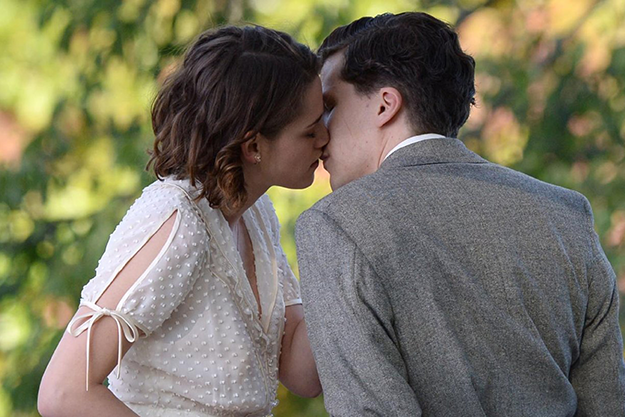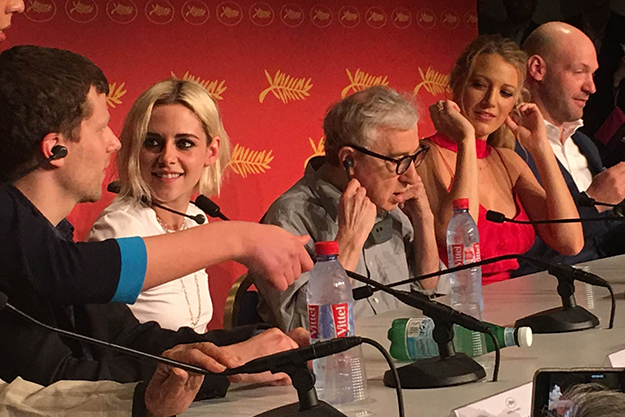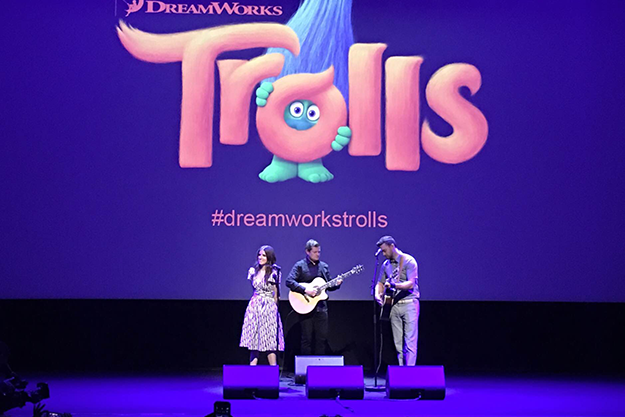Cannes Dispatch #1: Café Society and Trolls
Café Society
An older man, a younger woman. A love triangle. Such is the story portrayed in Woody Allen’s Café Society, the director’s third movie to open the 69-year-old Cannes Film Festival. Debuting tonight in the South of France, Allen’s new film is set in 1930s Hollywood and follows an ambitious but neurotic young man from the Bronx (Jesse Eisenberg) who heads West to find a career. Sitting in the office waiting for a meeting with his uncle (Steve Carell), a powerful Hollywood agent, he meets a confident young woman (Kristen Stewart) and quickly falls for her. Little does he know that this secretary has another suitor.
Eisenberg’s cadence is a lot like that of the characters often found at the center of Allen’s movies. His deadpan, self-deprecating delivery is distinctively Allen’s and mixes well with the period jazz music also characteristic of the filmmaker’s oeuvre. Allen said yesterday that he doesn’t exactly write about himself, but at the same time admitted that he writes what he knows.
“If it were years ago I would have played this part,” Allen said during a press conference this afternoon here in France, adding that, as a comedian, “I would have played it more narrowly, I would have given it one dimension. Jesse is an actor. All I can say is, it’s much deeper played by Jesse than anything I would have done with it.”
Allen’s own voice is at times heard on-screen in this quietly humorous latest effort by the aging American auteur. While, at 80, he was too old to play the lead role, Allen’s narration holds together the film’s plot, a mix of industry rituals on the West Coast alternating with East Coast mafia intrigue.
Set in Hollywood during the Golden Age, Café Society’s characters go to the movies a lot—they visit the Chinese Theatre on Hollywood Blvd. or head over to the Vista out in Los Feliz—and, working in the movie business, they also frequently reference Tinseltown’s stars and lore.
Photo by Eugene Hernandez
“I was brought up on Hollywood movies and they had an indelible influence on me,” Woody Allen said yesterday as the Cannes Film Festival kicked off. “It comes from my upbringing, my childhood.”
The film is a fitting opener for Cannes, which each year arrives on a wave of nostalgia mixed with thoughtful consideration about the state of cinema. Do movies still matter? Does the festival?
Tens of thousands of industry types—filmmakers, executives, critics, and curators—gather from around the world to survey the latest in world cinema and bemoan the challenges of the contemporary movie business. Daily printed trade papers here report on movie deals, fashionable red-carpet moments, and insider buzz. At parties and bars around town, before and after screenings, today’s movie folks gossip and talk shop constantly.
Golden hues and dark shadows punctuate the look of Café Society. This is worth noting because it marks the first time that Woody Allen, who makes movies annually, has worked in HD. He enlisted the great cinematographer Vittorio Storaro to shoot for him as he left film stock behind and embraced the digital future of cinema (his new movie was acquired by Amazon Studios).
“We have the relationship with light and shadows and color,” Storaro noted during a press conference yesterday, saying that he loved the collaboration with Allen. “You have to use the language of images. Digital is part of the language of progress. You have to face it with knowledge.”
“If anything, you have more options later if you are working digitally,” Allen said, hardly sounding wistful about not shooting his latest with film stock.
On its opening day, Cannes organizers looked back at Hollywood with Woody Allen’s Café Society and also pondered its digital future when considering Allen’s high-def imagery and taking a sneak peek at scenes from DreamWorks’s upcoming holiday animated effort, Trolls.
Photo by Eugene Hernandez
“Today, animation is as exciting as it’s been at any time in my career,” said Jeffrey Katzenberg, a founder of DreamWorks who has showcased more than a dozen animated movies on the Croisette over the years. He got his start in such features when he ran Disney and ushered in its acclaimed era of animated movies, from The Little Mermaid and Beauty and the Beast to The Lion King (and then Shrek after he launched DreamWorks with Steven Spielberg and David Geffen).
Standing onstage inside the packed Debussy Theatre after the morning’s first screening of the Woody Allen movie, Katzenberg stumped for the artistry of animated films and hailed the Cannes festival for its continued embrace of the art form.
“We have pushed the bounds of digital,” Katzenberg said, previewing the fluid camera movements and meticulous textures of the elfin characters in Trolls, a musical comedy that will hit theaters in early November.
Trolls are perpetually happy, explained the film’s directors Mike Mitchell and Walt Dohrn, during the session. But in the film, they face negative forces that aim to destroy them. With an apparent nod to contemporary geopolitics, the society faces a looming threat from a dark outside force. A mismatched duo, voiced by Anna Kendrick and the film’s executive music producer Justin Timberlake, embark on a rescue mission to save their kind. Happiness battled negativity in scenes shown yesterday to hype the new franchise.
Katzenberg noted that ever since the first animated feature film, Snow White and the Seven Dwarfs, “music has played a major role” in such movies. Yesterday, after showing a key scene in the battle between good and evil, he introduced Kendrick and Timberlake to sing a song from the film’s soundtrack, a version of the Cyndi Lauper’s “True Colors.”
Katzenberg, ever the showman, invited the audience to pull out their mobile devices to capture the moment and share it.
Social media stoked attention for the opening of the Cannes festival throughout the day as attendees shared key moments, from press conference quips and photos of festivalgoers’ troll-hair hats to a racy rape joke by the emcee at the fest’s opening ceremony tonight.
Earlier in the afternoon, Woody Allen, Kristen Stewart, and Jesse Eisenberg were asked about fame and gossip, elements that are woven into the narrative of Café Society.
“For a career in the freelance arts, fame is the most valuable currency,” offered Eisenberg, while Allen added, “There are great, great upsides to it and great downsides to it. The perks far outweigh the downsides.”
Stewart, acclaimed in numerous recent performances for international auteurs, said more plainly that fame comes at a cost: “It’s like the most gnarly popularity contest in the world,” she noted. “You take high school and make it in the real world. It amplifies everything; it’s pretty intense.”
Woody Allen avoided engaging tabloid fodder, including a front-page trade-paper slam by his son Ronan Farrow here in Cannes. Allen only spoke personally with regard to his longevity.
“Someday I’ll probably have a stroke and be like this,” he said, gesturing with a shaking raised hand. “Look, that guy used to be Woody Allen,” he joked, noting that his parents made it to nearly 100 years old each and that he expects to live on for awhile.
“Until that happens,” Allen quipped, “I’ll just continue to make films.”










